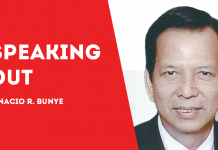
IN THE current deliberations on the proposed amendments to the economic provisions of the 1987 Constitution, one of the overarching themes has been the need for the country to catch up with the rest of the world.
For a time, the Philippines was far ahead of many of its Southeast Asian neighbors whose economies were still closed to the outside world. In the past decades, these economies have since embraced liberalization and opened up its doors on all fronts — recognizing that this is the way to go if they are to grow at a pace that will allow them to become globally competitive.
As chairman of the Senate’s subcommittee on constitutional amendments and revision of codes, we started our deliberations on Resolution of Both Houses No. 6 (RBH No. 6) that proposes to amend three provisions of the Constitution that deal with opening up public utilities, education and advertising to foreign ownership.
While it may not stand out, including education in the scope of the amendments is key to our goal of becoming an industrialized nation, albeit with a caveat — that we will only be touching on higher education.
We understand that there is some confusion about the scope of RBH No. 6 on liberalizing the education sector. Many people who read the resolution interpreted it to mean that even basic education would be opened up to foreign ownership. This was never the intention of the authors of the resolution, myself included.
The intention is to keep basic education in the hands of Filipinos. As the late Constitutional Commission member Chito Gascon explained in the records of the body when it was crafting the 1987 Constitution, the philosophy behind the 100 percent Filipino ownership requirement was about assuring that our educational institutions play a role in instilling values and consequently molding public opinion.
This is reflected in the Constitution which mandates all schools to teach patriotism and nationalism; appreciation of the role of national heroes in the historical development of the country; and the rights and duties of citizenship. We intend to maintain this goal insofar as basic education is concerned.
What we want to see with the relaxing of restrictions in the higher education sector is to have more of the world’s best educational institutions and educators bringing in their knowledge and know-how for the benefit of our learners and eventually to the industries that will hire them. This will help improve our competitiveness as individuals and as a nation.
We have repeatedly stated during our hearings on RBH No. 6 that charter change should not be seen as a cure all for all the troubles being faced by our country. We’re not saying that amending the Constitution is the number one requirement of foreign investors when they look at the Philippines as a potential destination. Even if we amend the charter but we don’t address issues such as corruption and bureaucratic red tape, then the entire effort will be for naught.
It’s not an all or nothing approach, meaning do we need charter change at the expense of all the other legislative and administrative reforms. The question will always be if amending the Constitution will help bring us closer to the promise of greater prosperity, among other things.
The question is not if charter change is it the only solution but rather is it a possible solution alongside the whole slew of other reforms. As legislators, we often make the mistake of thinking sometimes that we can solve all of the world’s problems.
But at the end of the day, we can only come up with legislation. We cannot do administrative reforms, we are not an anti-corruption body, we can do oversight but there are limitations. Constitutional reform should be viewed through that lens.
Industries will always need skilled personnel but the problem that we have always faced is that we produce a lot of competent and skilled graduates but sadly there is no ecosystem for them to thrive or work in.
I have no doubt that we produce good graduates but my worry is always where they will end up. If we don’t have that ecosystem in place then we will continue to suffer from the brain drain and we will just be educating for migration.
The efforts to reform the education system should go hand-in-hand with the development of industrialization policies. President Ferdinand Marcos Jr. is expected to sign our pet piece of legislation, the Tatak Pinoy bill into law shortly.
Tatak Pinoy is precisely an attempt at coming up with an industrial policy. With Tatak Pinoy, we will hopefully address the lack of ecosystem in the various industries. We want to see the day when the professionals we produce such as scientists and medical practitioners will no longer have to go overseas because they now have a place to work here at home.
***
Sen. Sonny Angara has been in public service for 19 years—9 years as Representative of the Lone District of Aurora, and 10 as Senator. He has authored, co-authored, and sponsored more than 330 laws. He is currently serving his second term in the Senate.
***
Email: sensonnyangara@yahoo.com| Facebook, Twitter & Instagram: @sonnyangara/PN







